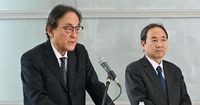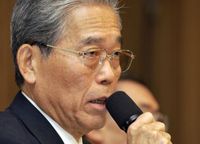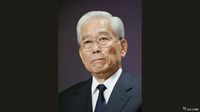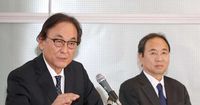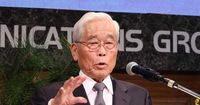On March 27, 2025, Fuji Media Holdings (FMH) announced significant changes in its management structure, marking a pivotal moment in the company's history amid ongoing controversies. Hisashi Hieda, the chairman of both FMH and its subsidiary, Fuji Television, will resign from his positions following the general shareholders meeting in June. This decision comes in response to mounting criticism regarding the company's handling of a sexual harassment incident involving former talent Masahiro Nakai and a woman, which has severely impacted the company's reputation and financial performance.
Hieda, who has been a dominant figure in the company for over 40 years, will officially step down from Fuji Television on March 27 and from FMH in June. His resignation is part of a broader effort to revamp the management team and restore trust among shareholders and business partners. President Osamu Kanemitsu of FMH stated that Hieda had agreed to the restructuring, emphasizing that the management will operate independently moving forward. "If there were concerns about Hieda's influence remaining, this personnel change would not have been possible," Kanemitsu remarked.
In a bid to enhance corporate governance, FMH announced that the board of directors will be reduced from 17 to 11 members, with independent outside directors making up more than half of the board. Additionally, the company aims to increase the ratio of female directors to at least 30% and significantly lower the average age of board members. These changes are intended to foster a more diverse and effective leadership team.
Fuji Television will also undergo similar changes, reducing its board from 22 to 10 members. All internal directors and auditors currently in office, except for Yoshiharu Shimizu, who will be promoted to president of FMH, will resign by the general shareholders meeting in June. This restructuring follows a tumultuous period for the company, during which over 300 sponsors suspended their advertisements in response to the Nakai incident, leading to a drastic decline in advertising revenue.
The controversy began in June 2023 when it was revealed that Koichi Minato, then president of Fuji Television, failed to report Nakai's misconduct to the compliance department and did not halt his appearances on air. As a result, both Minato and Kanemitsu resigned earlier this year, underscoring the severity of the situation. The fallout has prompted a third-party committee to investigate the incident, with a report expected by the end of March 2025.
Kanemitsu and Shimizu addressed the media following the board meeting, highlighting the urgency of the management overhaul. "Restoring trust is a major point for us, and we believe that these changes are necessary," Kanemitsu stated. Shimizu added that they will sincerely accept the findings of the third-party committee, acknowledging the need for accountability.
Despite the recent upheaval, there are signs of recovery. Approximately 30 sponsors have resumed their contracts, bringing the total to around 100 companies. However, about 70% of advertisers are still hesitant to commit to new contracts, indicating that many are waiting to assess the outcomes of the third-party investigation and the effectiveness of the new management structure before making decisions.
Critics have pointed out that the timing of the management changes raises questions, particularly since they were announced before the third-party committee's report was released. Shinjiro Yatsuda, a professor emeritus at Aoyama Gakuin University, expressed skepticism about the decision, suggesting that management should prioritize the results of the investigation to inform their reforms. "Why announce this now? They should respect the investigation's findings before implementing management changes," Yatsuda stated.
Hieda's departure marks the end of an era for Fuji Media Holdings. He joined Fuji Television in 1961 and held various positions, including president from 1988 to 2001 and chairman from 2001 to 2017. His leadership has been credited with significant achievements, particularly during the 1980s when the company experienced substantial growth. However, his long tenure has also been criticized for fostering an environment where accountability was lacking.
In light of these developments, the future of Fuji Media Holdings hinges on its ability to navigate the aftermath of the Nakai incident and restore confidence among its sponsors and viewers. As the company prepares for the upcoming shareholders meeting, the focus will be on how effectively it can implement its new governance structure and address the issues that have plagued its reputation.
As the third-party committee's report looms, both Kanemitsu and Shimizu remain optimistic about the path forward. They are committed to ensuring that the new governance structure not only meets the expectations of stakeholders but also fosters a culture of transparency and accountability within the organization. The coming months will be crucial for Fuji Media Holdings as it seeks to rebuild its image and regain the trust of its sponsors and the public.
